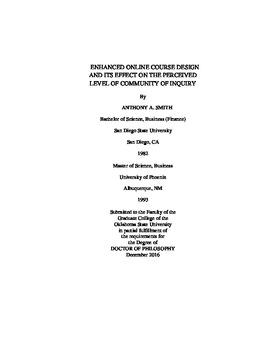| dc.contributor.advisor | Self, Mary Jo | |
| dc.contributor.author | Smith, Anthony A. | |
| dc.date.accessioned | 2018-06-29T14:32:29Z | |
| dc.date.available | 2018-06-29T14:32:29Z | |
| dc.date.issued | 2016-12 | |
| dc.identifier.uri | https://hdl.handle.net/11244/300337 | |
| dc.description.abstract | Academic institutions increasingly have adopted the online platform due to its low delivery cost and ease of scalability to large numbers of students. The pressure to increase enrollment numbers without enhancements to online course design have created the problem of lower retention and completion rates which can effect institutional funding. The purpose of this study was to explore the effect of enhancements to course design as well as class size on the level of perceived Community of Inquiry (CoI) experienced by college students. The primary research question was; what effect does enhanced online course design have on the perceived level of CoI among college students? A secondary research question was; what effect does class size have on the perceived level of CoI among online college students? The theoretical framework that informed this study was Community of Inquiry developed by Garrison (2000). This study employed a quasi-experimental research design since subjects were already enrolled in course sections. Cluster random sampling method was employed to select both the non-enhanced and enhanced class sections. The researcher surveyed subjects using a 34 question 5-scale summated CoI instrument including teacher, social, and cognitive presence. The population from which the sample was derived consisted of undergraduate college students over the age of 18 years old of any gender enrolled in at least one completely online 16-week class at the OSU-OKC campus. The researcher employed One-Way MANOVA and Pearson r correlation inferential statistical analysis to test all research hypotheses. The findings indicate that there is no evidence of significant effect between enhanced course design and the perceived level of CoI among college students. The findings regarding correlation of CoI scores and class size however showed there was a strong negative correlation between teaching presence, a moderate positive correlation between social presence, and a weak negative correlation between cognitive presence and class size. Other factors such as teacher training, facilitation by the instructor, student readiness, and the type of course taught and its effect to perceived levels of CoI might be considered for future research. | |
| dc.format | application/pdf | |
| dc.language | en_US | |
| dc.rights | Copyright is held by the author who has granted the Oklahoma State University Library the non-exclusive right to share this material in its institutional repository. Contact Digital Library Services at lib-dls@okstate.edu or 405-744-9161 for the permission policy on the use, reproduction or distribution of this material. | |
| dc.title | Enhanced online course design and its effect on the perceived level of community of inquiry | |
| dc.contributor.committeeMember | Thompson, Penny Marie | |
| dc.contributor.committeeMember | Stansberry, Susan L. | |
| dc.contributor.committeeMember | Robinson, Jeremy Shane | |
| osu.filename | Smith_okstate_0664D_14890.pdf | |
| osu.accesstype | Open Access | |
| dc.type.genre | Dissertation | |
| dc.type.material | Text | |
| thesis.degree.discipline | Education | |
| thesis.degree.grantor | Oklahoma State University | |
